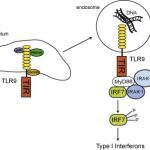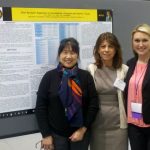Faculty Research – Who’s Who in SOD Dr SE Sahingur
Periodontitis is an inflammatory disease initiated by multiple pathogens. However, periodontal tissue destruction occurs as a result of exaggerated inflammatory response to these pathogens only in certain susceptible individuals. In addition, the uncontrolled, chronic periodontal inflammation is not only confined to local oral tissues but also contributes to the inflammation at distant sites affecting systemic health.
Dr. Sahingur’s research focuses on genetic and epigenetic susceptibility to inflammation and the link between periodontal and systemic diseases. Specifically, she is interested in the role of the innate immune receptors and their signaling in inflammation. These receptors are the body’s first line of defense against infection by other organisms. When the host immune system recognizes and responds to microbes through host innate receptors an inflammatory signaling cascade is initiated. This results in inflammatory cytokine production which can lead to tooth loss. Recently it has been shown that microbial nucleic acids are also recognized by the immune system and trigger inflammation.
 Dr. Sahingur is leading pioneering studies that investigate the role of microbial nucleic acid sensing in periodontal inflammation. She is specifically interested in the role of Toll like receptors. Recently she has described the up-regulation of nucleic acid sensors (TLR-8, TLR-9 and DAI) both at the mRNA and protein level in periodontal-diseased tissues compared to healthy sites. This demonstrates that nucleic acid sensing is an important contributor to periodontal inflammation and may provide a target for the treatment of the disease.
Dr. Sahingur is leading pioneering studies that investigate the role of microbial nucleic acid sensing in periodontal inflammation. She is specifically interested in the role of Toll like receptors. Recently she has described the up-regulation of nucleic acid sensors (TLR-8, TLR-9 and DAI) both at the mRNA and protein level in periodontal-diseased tissues compared to healthy sites. This demonstrates that nucleic acid sensing is an important contributor to periodontal inflammation and may provide a target for the treatment of the disease.
Her laboratory has also identified a specific genetic polymorphism in the TLR9 promoter region in patients suffering from chronic periodontitis. Dr. Sahingur’s team is investigating whether this genetic variant has a functional role in up-regulating TLR9 expression in gingival tissues leading to periodontal disease. This will provide important information for patient susceptibility to the disease and clinical management.
Nucleic acid sensors are implicated in the pathology of several diseases, including gastrointestinal and pulmonary infections, autoimmune diseases and cancer. The presence of periodontal bacterial DNA is also reported at distant sites. Therefore, elucidating the role of microbial DNA sensing will not only have clinical implications to control persistent periodontal inflammation in local tissues, but could also identify a link between periodontal and systemic diseases. This would have important implications for patient health and underlines the frontline health role that dentists have in patient care.

Currently, Dr. Sahingur and her team are involved in multiple projects including clinical studies. Dr. Sahingur has published several articles in peer-reviewed journals and presented at both national and international meetings. In recognition of her work she was recently awarded membership in Omicron Kappa Upsilon, Kappa Chapter, VCU. She has been the recipient of awards from the CCTR Endowment fund, Presidential Research Incentive Program (PRIP), A.D. Williams Funds, and Jeffress Memorial Trust Funds. She has also received a KL2 Award, Clinical and Translational Research Training Award. Her work has also been funded by the NIDCR.
Besides her role in research Dr. Sahingur is actively involved in clinical and didactic teaching. She serves as a course director and a lecturer in two courses for dental students and dental hygiene students. Additionally, she coordinates and lectures in the periodontics section of the International Dentist Program and facilitates the literature seminar discussion for periodontics residents. She also serves as an advisor for graduate students towards completion of their master’s and doctorate degrees.
Dr. Sahingur says of her research “I am very excited to be involved in research relevant to human health. As a clinician-scientist I believe I can bring specific insight to research questions in dentistry. I have the advantage of being aware of the challenges that are faced in the clinics and working on identifying solutions to these challenges at the bench side. I love that I can impact on my patients lives directly in the clinic and that the research that I do will contribute to better oral health in the future”
Categories Research